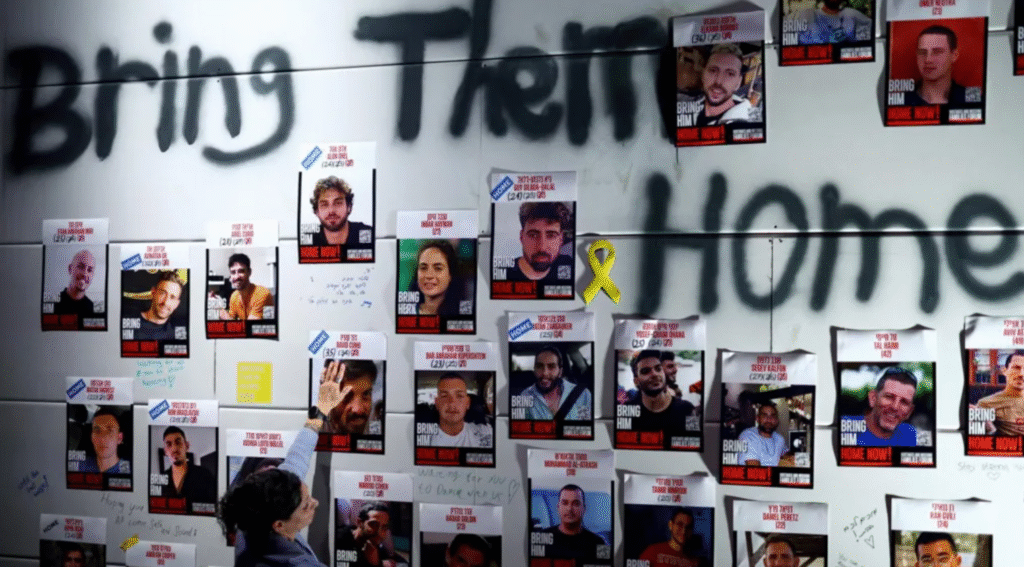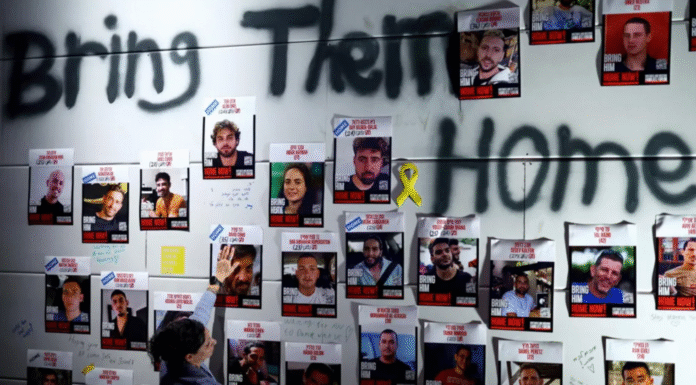Hostage Families Confirm Bodies as Israel-Hamas Ceasefire Faces New Strain
Hostage families confirm bodies of three of four hostages handed over by Hamas on Tuesday, reigniting tensions in the fragile ceasefire between Israel and the Palestinian group.
The Hostages Families Forum identified the deceased as Tamir Nimrodi (20), Eitan Levy (53), and Uriel Baruch (35). Israeli officials said the fourth body did not match any known captives, raising disturbing questions about who the person might be.
According to the Israel Defense Forces (IDF), forensic tests confirmed that the unidentified remains were not one of the hostages. The military urged Hamas to make “every possible effort” to locate and return the remaining deceased.

Seven Hostages’ Bodies Returned-But 21 Still Missing
So far, seven hostages’ bodies have been sent back from Gaza. Hamas has not yet completed its commitment to return the other 21 remains as stipulated in the U.S.-brokered ceasefire deal.
Frustrated Israeli officials accused Hamas of delaying the process, with reports suggesting Israel may tighten humanitarian aid until all bodies are recovered.
A senior Israeli source told Haaretz that if the situation persists, “no aid trucks will enter Gaza until our people are brought home.” Hamas responded that it is struggling to locate all bodies, citing the chaos of war and collapsed infrastructure.
Israel Threatens Restrictions as Hostage Families Confirm Bodies
As hostage families confirm bodies, anger surged across Israel. Officials hinted at halting shipments of food and medicine through the Rafah border crossing, where 600 trucks are currently waiting.
Israeli broadcaster Kan reported that Rafah might reopen for Palestinian movement only, not for humanitarian deliveries. A Cogat spokesperson emphasized that “humanitarian aid will not pass through Rafah, no such agreement exists.”
Defense Minister Yoav Gallant warned Hamas that any further delay would be seen as a “gross violation of the agreement” and met with forceful response.
Trump’s Ceasefire Plan Faces Its First Real Test
The U.S.-led peace plan by President Donald Trump aimed to end the two-year Gaza conflict through a 20-point framework. Both Israel and Hamas agreed to the terms, including the handover of 48 hostages by noon Monday.
However, the latest delay could jeopardize the second phase of the plan.
Trump himself posted on X: “A big burden has been lifted, but the job is not done. The dead have not been returned, Phase Two begins NOW!”
Palestinians worry that if Hamas fails to deliver the remaining bodies, ceasefire talks may collapse. Gaza writer Tayseer Abed called the standoff “a dangerous test for peace, one that could reignite conflict if either side refuses to move forward.”
A Fragile Calm: Life Under the Ceasefire
Since the ceasefire began on October 10, sporadic violence has continued.
The Palestinian Civil Defence reported seven deaths in two separate Israeli operations on Tuesday, including an Israeli drone strike in eastern Shejaiya that killed five civilians inspecting their homes.
The Israeli military claimed its troops acted against people who had crossed into restricted zones defined by Trump’s plan. Meanwhile, Hamas fighters re-emerged in several districts, executing eight Palestinians accused of collaboration, moves that residents described as “terrifying.”
Hostage Families Confirm Bodies Amid Mutual Accusations
As hostage families confirm bodies, public grief mixes with outrage. Many Israelis blame Hamas for cruelty and obstruction, while Palestinians accuse Israel of exploiting the situation to justify tighter control over Gaza.
Hamas insists it is working to “restore order” and prevent “lawlessness,” yet human-rights activists say these public executions suggest a dangerous return to fear politics.
Israeli Prime Minister Benjamin Netanyahu, speaking to CBS, said the next negotiation phase will proceed only if Hamas disarms completely.
“Hamas must give up its weapons,” Netanyahu declared. “If not, all hell breaks loose.”
Trump echoed that warning, asserting, “They said they would disarm. If they don’t, we will disarm them.”

World Leaders Push for Stability
The ceasefire’s signing in Washington brought together more than 20 world leaders, including UK Prime Minister Keir Starmer, France’s Emmanuel Macron, and representatives from Egypt, Qatar, and Turkey, key mediators in the truce.
Under the 20-point peace framework, Gaza will be temporarily managed by Palestinian technocrats under an international “Board of Peace,” with authority gradually transferring to the Palestinian Authority after internal reforms.
Yet major disputes remain, particularly over Israeli troop withdrawals, Hamas disarmament, and the future governance of Gaza. Hamas has repeatedly stated it will not disarm unless a sovereign Palestinian state is recognized.
The Human Cost Behind the Headlines
Since Israel’s 2023 military campaign responding to the Hamas-led attack that killed about 1,200 Israelis and took 251 hostages, Gaza’s health ministry reports over 67,800 Palestinians killed.
Almost 2,000 Palestinian prisoners were freed as part of Trump’s peace initiative, but families on both sides still endure deep trauma.
The return of bodies brings neither closure nor peace, only renewed grief and fear that the fragile ceasefire may unravel at any moment.

